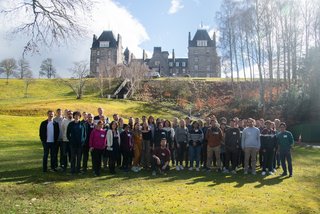In March 2023, I attended a short training course organized by the Seismological Parameters and INstrument - Innovative Training Network (SPIN-ITN), funded by the European Commission. The course, entitled “Interrogating the Restless Earth”, was held in Pitlochry, a cozy small town in the Scottish Highlands. The main topic of the course was “Inversion approaches in seismological problems”, with lectures given by reknown Professors and researchers in seismology from Europe. On the last two days, there was a more practical lecture on Machine Learning tools in seismology. This short course helped me to strengthen the concepts and theory of the non-linear joint inversion I applied for the last part of my PhD work. Beyond this, the Machine Learning tools learnt during the practical lecture were quite helpful for a side project I was involved in the Bensberg Earthquake Observatory and something I am planning to continue working on in the future.
I also had the opportunity to meet other PhD students and PostDocs from other institutions such as IPGP (France) or ETH (Switzerland), among others. The atmosphere was very pleasant and friendly, as both participants and lecturers were all staying in the same hotel (which you can see in the photo at the back). This gave space for more relaxed conversations and socializing outside the “classroom”, with a beer or, of course, a british cup of tea. I even had initial conversations for a potential Postdoc position, which was great as I am in the final stages of my PhD.
Definitively, attending this short course, thanks to the support of the GSGS travel grant, was in some ways an even more rewarding experience than attending large conferences. Lesson learnt: don’t wait for the big conferences and check on the small workshops/courses in your field!
Sebastian Carrasco
PhD student
Bensberg Earthquake Observatory, Institute of Geology and Mineralogy
PhD project: “Multi-scale investigation of the subsurface structure at the InSight landing site, on Mars, using single-station seismology”
